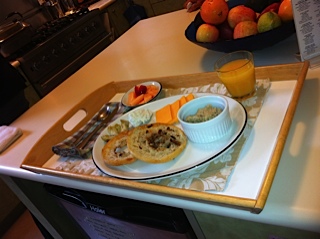Nowhere else have I seen serving food to the very sick elevated to such an art, as at the Zen Hospice Guest House. It does not matter whether the person is blind, can no longer smell, or can barely eat. Food is still served on a beautiful tray with freshly ironed linen, porcelain dishes and silver utensils, all tastefully displayed. Only fresh, organic ingredients are used, and the cook goes to great lengths to prepare meals that are both pleasing to the eyes and easy on the palate. Individual food preferences are encouraged and honored.

Volunteers are also trained to view the experience of assisting residents with their meal as a mindful care practice, an opportunity to commune with the person in a profound way. I will never forget the time during volunteer training when we were asked to role-play being a resident:
Sitting in a chair, eyes closed, I am supposed to be dying. I only have a few more days to live, and can no longer speak because of the lesions in my mouth. I have also lost my vision, and I am too weak to lift my arms. A woman introduces herself. She appears to know me, but I can't remember if I met her before. Her gentle voice feels good. "Today is a beautiful spring day. The sun is out, and the flowers are in full bloom. Would you like to eat? Some strawberries and cream?" I am not really hungry, but I figure why not... "Are you ready?" I nod yes. "Here it comes, open your mouth." Hard metal spoon, cream softness and big chunks make their way in, all at once, against parting lips and tongue. Still-working mind makes association with memory of cold speculum entering body during gynecological exam. I find I am really not hungry. Nevertheless, I manage to slide down the whole slew. My heart wells up with sadness and frustration. I am feeling incredibly tired. "Do you want some more?" My face says no. Woman offers to hold my hand. That I will take.
The memory of the cold spoon, and the big chunks of food, and of almost total powerlessness is one I have taken with me every time I have had the privilege to serve someone too sick to eat on their own. If you are a caregiver and your loved one is in need of complete assistance with food, I highly recommend you subject yourself to that exercise. It will change the way you are with your loved one, in a very good way.
Other useful tips I would like to pass on:
Make dining an experience that is both comfortable and pleasing for the senses:
- Offer meals at regular times, and in same place
- Talk to your doctor about most appropriate consistency for the food
- Pay attention to the presentation
- Maybe put on some soft music
- Check ambient temperature and set to average comfort level
- Serve comfort foods and drinks
- Make sure food temperature is just right -- wait a bit if too hot, or reheat if food gets cold
Maximize choice opportunities, no matter how small:
- When to eat, now or later
- Giving food options
- Order in which to eat
- Opportunity to try eating on their own or with little or total assistance
- Eating with fork and spoon, or with fingers
- Timing of each bite, each sip
- Amount in each spoonful
Engage the person
- Sit down with the person
- Position yourself so that you can make eye contact
- Tell what is being served with each course, and ingredients used
- Match the person's pace
- Make this a social event, including small talk and humor
- Reminisce
- Make this a mutual experience and share food together
Food is one of the last few pleasures left when illness leaves one laying in bed in a small room with little else available in terms of sensory gratification. Food is also an important part of caregiving. Preparing good food, and serving it the Zen way can help deepen our connection with our loved one, and transform this most ordinary task into an act of love and compassion. More selfishly, it is also a mindfulness practice in its own right, one that can help us alleviate some of the stress of caregiving.
For more by Marguerite Manteau-Rao, click here.
For more on caregiving, click here.